

Canada’s problem with its Sikh minority should be of concern to Americans not just because Vancouver borders on the US, but for the broader lessons this story of ethnic conflict teaches. When a country imports an alien population, it often brings in all of the conflicts that bedeviled the immigrants in their homelands. Consequently, Western nations can get dragged into intractable conflicts that would otherwise be none of their business. Moreover, differences between the immigrant and host populations are likely to prove disruptive, even disastrous. Differences in history and culture pose difficulties enough, but most divisive are differences in nature. As long as we continue to ignore the possibility that there are biological differences among races that cause them to create different types of societies, we run the risk of importing populations that are prone to poverty and crime and hostile to white people and their values.
One could almost pity the plight of white supremacists these days. Their political influence has diminished greatly and their numbers are dwindling. A black man is the most powerful person in the world. Fearing public ostracization, they constantly have to ensure their words never betray their thoughts. In 2009, being a racist just isn’t cool anymore. But that hasn’t stopped this vocal minority from trying their best.
“White Pride” sites on the internet are full of rants against various ethnic and racial communities, blaming them for everything wrong with the world’s economic, social and political woes. Usually, its African Americans, Hispanics or Jews that are targeted. Now it looks like the Sikhs have caught their attention.
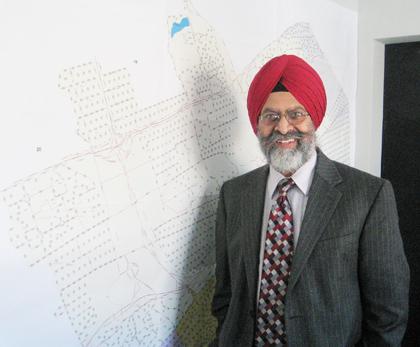
Photo by Howard Koplowitz.
Swaranjit Singh is running for New York City Council, representing Queens. An underdog in a new campaign for a new voting enclave, he’s running, in part, to ensure that “roti-eating people” have a voice, and a say, in New York’s politics:
“My biggest goal is to unite the roti-eating people. Only when we are united, that’s the way we can get any [political] positions,” Singh said… “We can make a difference…” [link]
He emphasized that he’s running to represent all people in the district, but that the desi population in the region is rapidly growing and that there’s a need for community participation and cultural understanding throughout government. At present, desis (mostly Sikh) represent roughly 34% of his district’s population.
As the 25th anniversary of “1984” approaches us, TLH posts have covered some activities commemorating this devastating time in our history.
My most vivid memories of “1984” are watching Indira Gandhi’s funeral on television and the border of photos inside my local Gurdwara’s Langar Hall of the men who had been tortuously killed during the Khalistani movement. As I got older, I always wondered how Sikh women were impacted by these events, aside from the infamous photo of a widow crying with her child in her arms.
I read about a woman who was strongly involved in the Sikh student movement in Punjab but now lived on the East Coast (USA). At the Fremont Gurdwara, I remember the single picture of a woman who helped make the border of Shaheeds’ photos hung high in the Langar Hall. I recall the emotional testimonies of widows left deserted by our community and the Indian government in the film, “Widow Colony”. Most recently, I came across this poem, “Don’t Feel Sorry For Me, I Am The Daughter Of A Shaheed” written by woman who lost her family in the 1984 riots in Delhi.
The press, unsurprisingly, has paid significant attention to Barack Obama’s inauguration. The importance of Obama’s ascendancy to the presidency — in terms of its symbolic and historic significance as well as the substantive policy changes that will follow — cannot be overlooked. Interestingly, the Sikh aspect of Obama-mania also has reached the pages of prominent press outlets. Those reports contain some good news, and even some bad. First, the good….
 Obama gained points when he took the time to provide answers to a questionnaire about Sikh interests and concerns. Indeed, a Harvard professor on religion and the religious diaspora in America, noted: “The Sikhs heard from you too. Your response to the questions… made it clear that you know your Sikh constituents and have a real concern for the issues of discrimination, hate crimes, and profiling they have faced. Your thoughtful response to the Sikhs stood in stark contrast to that of your opponent: ‘No Response.'”
Obama gained points when he took the time to provide answers to a questionnaire about Sikh interests and concerns. Indeed, a Harvard professor on religion and the religious diaspora in America, noted: “The Sikhs heard from you too. Your response to the questions… made it clear that you know your Sikh constituents and have a real concern for the issues of discrimination, hate crimes, and profiling they have faced. Your thoughtful response to the Sikhs stood in stark contrast to that of your opponent: ‘No Response.'”
Also, the Sikh Inaugural Ball — however viewed by some Sikhs themselves (see here and here for our previous coverage) — generally has been favorably seen by non-Sikhs. The Washington Post, for example, profiled a Sikh woman’s journey from California to Washington, DC, to attend the ball. The overarching theme of the piece was how Obama’s election has reinvigorated the Sikh woman’s conception of politics and her place in America. “Now,” she said, “I feel I can call this country my home.” [Aunty Ji, Gulshan Gachoke, is pictured at right.]
The Wall Street Journal, another respected publication, reported from the ball itself. In addition to discussing the details of the ball, the Journal offered this observation: “Several people at the event drew a comparison between Barack Obama and Manmohan Singh, the first Sikh prime minister of India, a country where only 2% of the people identify as Sikh.” (I haven’t drawn this connection in my own mind, but a healthy debate may be had about whether a meaningful link between the two may be made on the basis of their minority status and respective places in the American and Indian governments.)
And now the “bad”….
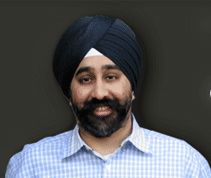 Word has passed through the grapevine that a Sikh candidate is up for election as council member-at-large in the upcoming Hoboken City Council race. Meet Ravinder (“Ravi”) Bhalla, a New Jersey native and attorney currently serving as a committee member for his district. A Democrat, Bhalla is running on a platform that centers around limiting property taxes and “increasing fiscal responsibility” in addition to focusing on transparency and modernization of public archives/resources:
Word has passed through the grapevine that a Sikh candidate is up for election as council member-at-large in the upcoming Hoboken City Council race. Meet Ravinder (“Ravi”) Bhalla, a New Jersey native and attorney currently serving as a committee member for his district. A Democrat, Bhalla is running on a platform that centers around limiting property taxes and “increasing fiscal responsibility” in addition to focusing on transparency and modernization of public archives/resources:
Hoboken is a great city, but as many people feel these days, we can do much better. Property taxes and spending are out of control. Too many important decisions are made in the shadows of City Hall and without the knowledge or involvement of ordinary citizens. [link]
Bhalla is running in an overwhelmingly white suburb of NYC that currently has only one non-white city councilmember. In exploring his own background as a practicing Sikh and as an attorney, some of his work has featured relatively prominently around civil rights issues and freedom of religion:
The dance continues. India’s infamous Central Bureau of Investigation just made a trip to the US to record testimony from two witnesses who identified Jagdish Tytler as an organizer of three days of violence in 1984 against Sikhs in Delhi.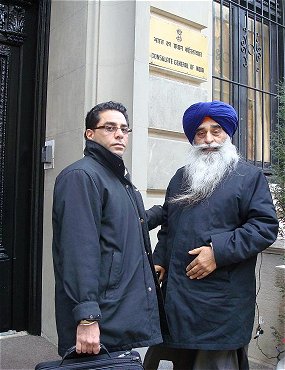
A team from India’s Central Bureau of Investigation came to the U.S. Dec. 22-26 to take testimony from two key witnesses who allege that former Union Minister Jagdish Tytler organized three days of violence against Sikhs in New Delhi 1984, following the assassination of Prime Minister Indira Gandhi. [India West]
Jasbir Singh, one of the men whose testimony was taken, was a witness before the Nanavati Commission in 2004. The Nanavati Commission found that there was sufficient evidence against Tytler to open an investigation against Tytler. However, the CBI closed the investigation last year claiming that it couldn’t find the witnesses.
The Nanavati Commission concluded that sufficient evidence against Tytler existed to launch an investigation. The CBI had closed the case against Tytler — still a prominent member of the Congress party — last September, saying it could not find the witnesses. It reopened the case after several media reported that Jasbir Singh was residing in Fremont, Calif. [India West]
During this holiday season of hard times, not even houses of God have been spared. Some lenders believe more churches than ever have fallen behind on loans or defaulted this year. Some churches, and at least one company that specialized in church lending, have filed for bankruptcy. Church giving is down as much as 15% in some places, pastors and lenders report.
An article in today’s Wall Street Journal highlights the financial pressures being faced by many churches across America. From my perspective, there’s two implications for Sikhs here, one a threat and the other an opportunity.
“There have been too many churches with a ‘build it and they will come’ attitude,” says N. Michael Tangen, executive vice president at American Investors Group Inc., a church lender in Minnetonka, Minn. “They had glory in their eyes that wasn’t backed up with adequate business plans and cash flow.”
I like to spend winter catching up on all the reading I’ve left by the wayside, but imagine my surprise when I came across these op-eds. The first argues that the Sikh youth slate (an all amritdhari slate) that won in Surrey is “fundamentalist,” while the other article argues that Sehajdari Sikhs are, by definition, not Sikhs at all.
Both of these op-eds are a little insane to me. The first argues that the Surrey gurdwara’s prior practice of allowing uncovered heads, shoes, and tables/chairs in the langar hall somehow constituted a “moderated” practice of Sikhi, and it effectively calls for a stand against the amritdhari youth slate, which it maligns as fundamentalist, orthodox, rigid, etc. The second article argues that there is no room in Sikhi for Sehajdari individuals, and then proceeds to trace the history of in/exclusion of non-kesdari Sikhs in SGPC elections.
Over the weekend it was reported that two Indian fighter jets violated Pakistani airspace. Although the Indian state is claiming the trespass was inadvertent, it seems that such a move is meant to engage in a ‘psychological escalation’ and pressure Pakistan into taking bolder actions against various militant groups.
However from talking to relatives in India and keeping abreast of the situation through Indian and Pakistani newspapers, it seems that an Indian strike against Pakistan is becoming a foregone conclusion. Anytime India and Pakistan have come to blows, it is the Punjab that is on the frontline. Thus while all South Asians should be aware of the ongoing situation, Sikhs in particular should be paying stark attention. Stratfor has provided an interesting analysis of the situation, which I try to summarize some of the points here.
 As someone who is excited about the incoming administration, I have thought about ways in which I would like to participate in the presidential inaugural, when President-Elect Barack Obama will become the 44th President of the United States. In particular, I thought about attending an inaugural ball — a politically-oriented prom of sorts. As a result, I reviewed this Washingtonian blog post, which contains a list of many of the inaugural balls taking place on or around the date of the inauguration, January 20, 2009.
As someone who is excited about the incoming administration, I have thought about ways in which I would like to participate in the presidential inaugural, when President-Elect Barack Obama will become the 44th President of the United States. In particular, I thought about attending an inaugural ball — a politically-oriented prom of sorts. As a result, I reviewed this Washingtonian blog post, which contains a list of many of the inaugural balls taking place on or around the date of the inauguration, January 20, 2009.
To my surprise and delight, the list included a “Sikh Inaugural Ball.” The ball is hosted by an organization I had never heard of: the Sikh Community Center. The web site for the ball states:
Here is your chance to make a statement and be seen and heard — in WASHINGTON! — when the entire world will have their eyes and ears on the most important event ever to take place! Don’t you wish you were there?
On January 20th, 2009 the inauguration of America’s 44th President is just such an occasion that you will not want to miss.
You’ll also want to meet other like-minded people so you can make the connections you will need over the next 4 or 8 years!
The Sikh Community Center is proud to announce that the 1st EVER SIKH INAUGURAL BALL takes place just a few blocks from the White House – at Ascot, I-The Indian Experience Restaurant.
Whether or not to attend the inaugural festivities is an undoubtedly difficult decision — because of the exorbitantly high prices for rooms, parking issues, and the limits of public transportation, for example. But if you are considering making the trip to D.C., the Sikh Inaugural Ball is an option.
Please note: I make no representations about the quality of this event — as always, buyer beware!
Jodha previously blogged about national-level elected Sikh leaders and rightfully noted the low representation of leaders from the UK. This week, Councillor Gurcharan Singh was chosen to represent the Conservatives as the Parliamentary Candidate for Ealing Southall. Ealing Southall has one of the highest proportions of Sikhs in any constituency in the UK and contains the Sri Guru Singh Sabha Gurdwara, one of the largest Sikh 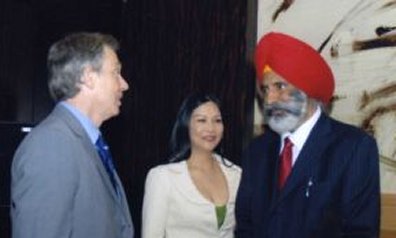 temple’s outside of India. Chairman of the Ealing Southall Conservative Association, Manjit Singh notes,
temple’s outside of India. Chairman of the Ealing Southall Conservative Association, Manjit Singh notes,
“The people of Ealing Southall are fed up with Labour and want an MP who can make a difference. After the next election we will have a new Conservative Government led by David Cameron and a new Conservative MP for Ealing Southall in Gurcharan Singh. I look forward to taking our message to the voters and getting rid of this tired Labour Government and the local MP who is more interested in collecting his allowance than in serving residents.” [link]
Interestingly, Gurcharan Singh was one of five representatives who left the Labour party last year to join the Conservative party. Gurcharan Singh moved to the UK in 1972 and originally joined the Labour Party in 1976 and became a councillor in 1982. Last year, the Labour party faced internal division over their candidate selection and following Virendra Sharma’s selection several Sikh Labour councillors, led by Gurcharan Singh defected to the Conservative party. In June 2007 (and in the picture above with Tony Blair – Labour party) Gurcharan Singh said,
“I am full of hope for the future as this to me signals the beginning of an era where the Labour party can consolidate its leanings over the last few years and move forward with a new outlook based upon positive change. We progress.” [link]
The contents of an email from Tarlochan Singh, a member of the Indian Parliament, to Jagpal Singh Tiwana were published in The Sikh Times recently. 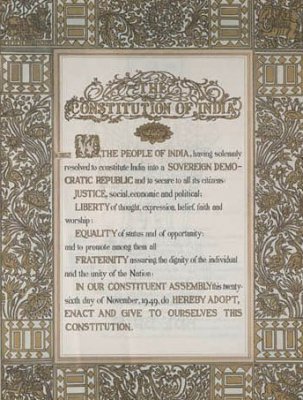 Apparently, the member of Parliament is trying to have the Indian Constitution amended so that Sikhs are no longer referred to as Hindus for the purposes of Article 25 (freedom of religion).
Apparently, the member of Parliament is trying to have the Indian Constitution amended so that Sikhs are no longer referred to as Hindus for the purposes of Article 25 (freedom of religion).
Dear S. Tiwana Ji,
When I became a Member of Parliament I moved a Private Members Bill for an amendment of Section 25 of the Indian Constitution such that the Sikhs are treated as an independent religion. Under the present Constitution Sikhs are regarded as part of the Hindus. So this amendment is required for getting us independent status. My bill came before the House for discussion twice but due to disturbances in the House no proceeding could take place. Now I am waiting for the next opportunity. [The Sikh Times]
Currently, freedom of religion in India’s Constitution (Article 25) reads as follows:
Thanksgiving is a time to reflect and celebrate what we are thankful for, rather than commemorate the manipulative actions of the Pilgrims (yes, in many ways this statement makes me feel better when I have my Thanksgiving meal)!
One of the things I am thankful for this year is Barack Obama’s victory as the 44th President-elect of the United States of America. It has been wonderful to be alive to witness this moment in history. As the saying goes, you can only truly value and appreciate yourself if you can also laugh at yourself. So, I will extend this belief to Barack Obama’s presidential win. So, let’s laugh at this satire on Obama supporters (especially if you were one of them 🙂 … I know I did)!
Have a good Thanks-Giving!

The elections are over, but even after the last card has been punched and the last absentee ballot counted, the political fervor that they ignited is still alive. While the country took two steps forward on its march towards complete civil rights by electing its first African American president , it took a step back by taking away the rights of particular individuals. California’s Prop. 8 received national attention (no surprise with more than $70 million in campaign spending). The proposition reversed a ruling from the California Supreme Court, which earlier this year declared that banning same-sex marriages was discriminatory. Prop. 8 – which passed albeit by a hair – will for the time being change the state constitution to define marriage as only between a man and a woman.
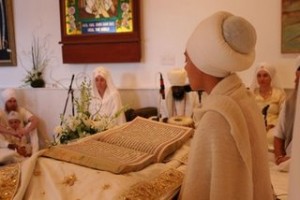 People feel really passionate about this topic. Really really passionate. What interests me the most, however, are the arguments for and against same-sex marriages and particularly what it does or does not say in the Sri Guru Granth Sahib about this topic. People are actually using words from the Sri Guru Granth Sahib to make their point – and I’m not sure that’s legit. In fact, I’ve been following a heated discussion on a certain social networking site where young Sikh individuals have been going back and forth about what voting for or against Prop. 8 means. The most common argument against same-sex marriages is that in the Sri Guru Granth Sahib it states that marriage is the union of two souls, husband and wife, man and woman, male and female. The other side of the argument is that Sikhi advocates equal rights for all and the Sri Guru Granth Sahib does not specifically make any comment on same-sex marriages. However, there seems to be a lot of ambiguity as to what is actually said. One reference states,
People feel really passionate about this topic. Really really passionate. What interests me the most, however, are the arguments for and against same-sex marriages and particularly what it does or does not say in the Sri Guru Granth Sahib about this topic. People are actually using words from the Sri Guru Granth Sahib to make their point – and I’m not sure that’s legit. In fact, I’ve been following a heated discussion on a certain social networking site where young Sikh individuals have been going back and forth about what voting for or against Prop. 8 means. The most common argument against same-sex marriages is that in the Sri Guru Granth Sahib it states that marriage is the union of two souls, husband and wife, man and woman, male and female. The other side of the argument is that Sikhi advocates equal rights for all and the Sri Guru Granth Sahib does not specifically make any comment on same-sex marriages. However, there seems to be a lot of ambiguity as to what is actually said. One reference states,
[The Sri Guru Granth Sahib] is seemingly silent on the subject of homosexuality; however, married life is encouraged time and time again in Guru Granth Sahib Ji. Whenever marriage is mentioned, it is always in reference to a man and a woman. Some Sikhs believe that Guru Granth Sahib Ji is the complete guide to life, and if a marriage between two of the same sexes is not mentioned, it is therefore not right. The counterargument to this is that man and woman are only mentioned in this way to give light to the relationship of the soul and the soul force as being one. This denies gender and sex as an issue. Thus, Sikhism is more concerned with ones attainment of enlightenment rather than habitual desires such as sexuality. True love is attained through the Guru and no man speaks on behalf of the Guru as the Granth is open to interpretation and misrepresentation. [Link]
Unfortunately South East Asia’s coverage in The Langar Hall remains sparse, except for often tragic stories that make the world headlines.
Here we report on something much more pleasant.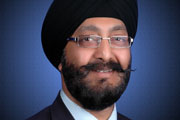
It seems that in New Zealand, we have our first Sikh elected as a member of parliament (MP). Delhi-born businessman, Kanwaljit Singh Bakshi, won his precinct as a member of the conservative National Party, winning the immigrant-dominated Manukau East constituency in suburban Auckland.
Now I am the first to admit that I don’t know much about New Zealand’s politics, nor much about the National Party (other than that the “Nats” seemed poised to form the new government in New Zealand, after nearly a decade of Labour Party rule).
Still for some strange ethnic solidarity purpose (although I have a feeling I would have not voted for Bakshi), I do think his victory is a good thing for New Zealand in general and the Sikh community there in particular.
Barack Hussein Obama’s historic victory as the 44th President of the United States Of America is being celebrated not only in America, but across the world.
He said in his victory speech that:
This victory alone is not the change we seek. It is only the chance for us to make that change. And that cannot happen if we go back to the way things were.
It can’t happen without you, without a new spirit of service, a new spirit of sacrifice.
So let us summon a new spirit of patriotism, of responsibility, where each of us resolves to pitch in and work harder and look after not only ourselves but each other.
Thus, I leave you with a BBC news clip on how the World is reacting to Obama’s win. As people celebrate across the world, they also offer what they believe this “chance” for “change” means for American foreign relations!

As an UPDATE to my post a couple weeks ago, the Sikh Coalition has released the “2008 Presidential Elections Voter Guide For Sikh Americans”. P.S. McCain never responded … the guide contains some of his answers collected from outside resources (the Coalition became our #1 research assistant)!
According to the Sikh Coalition:
Our candidate questionnaire was provided to both the major party candidates in November 2007. Since then, the Sikh Coalition has provided all candidates multiple and repeated opportunities to answer its questionnaire. Our Voter Guide reflects the answers of the candidates who responded to our questionnaire.
The Sikh Coalition’s Sikh American Voter Guide includes information about how and where to vote on Election Day, summaries of proposed laws that affect Sikh interests, and the presidential candidates’ answers to our questionnaire. Of the 13 candidates running for president of the United States, a total of five responded to the Coalition’s questionnaire – including one of the two major party candidates.
The 25-page guide-book has a brief biographical section on all 13 candidates running for President, along with pictures (Prabhu Singh Khasla … Ralph Nader is represented)! In addition, responses from the candidates on questions addressing:
1) Relationship With Sikhs
2) Hate Crimes
3) Religious Profiling
4) Employment Discrimination
5) Discrimination
6) Asylum
7) Immigration
Check it out! Let’s us know what you think! Make copies and get them out to your sangats at local Gurdwaras before next Tuesday!
Vote On Tuesday (11/04/2008)! You can find your local polling place through Google here!


As the end of election season nears, the months of intense election coverage can get overwhelming. Hearing basically the same messages from both sides gets old. But one thing that’s been remarkable for me to see this election season is the level of civic engagement from a broad spectrum of civil society. For example, the kids in the above video sing a non-partisan song. Check it out. Half of them sing and dance for McCain and the other half for Obama (except for one stanza where they all sing for the Left, not sure why). These 7th grade students from the Ron Clark Academy in Atlanta just made election season enjoyable.
Obama on the left
McCain on the right
We can talk politics all night
And you can vote however you like
You can vote however you like, yeah
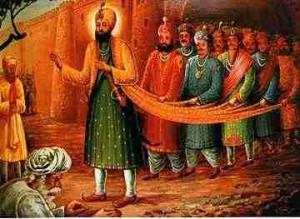 Many Sikhs participate in the celebrations of Diwali, the festival of light, without actually knowing what the significance of the date is in Sikh history. I can admit that for a long time, Diwali didn’t hold much importance for me because I didn’t fully understand why we celebrated it. In fact, today is not only Diwali but also marks Bandi Chor Diwas a day where Sikhs join together to celebrate the release of the sixth Nanak, Guru Hargobind Ji from imprisonment. The historic event itself should be acknowledged with significance – particularly the fact that upon order of his release from Gwalior Fort, Guru Hargobind Ji refused to leave unless the 52 princes who had also been imprisoned would also be allowed to leave. Thinking of others’ rights were more important than simply thinking of his own.
Many Sikhs participate in the celebrations of Diwali, the festival of light, without actually knowing what the significance of the date is in Sikh history. I can admit that for a long time, Diwali didn’t hold much importance for me because I didn’t fully understand why we celebrated it. In fact, today is not only Diwali but also marks Bandi Chor Diwas a day where Sikhs join together to celebrate the release of the sixth Nanak, Guru Hargobind Ji from imprisonment. The historic event itself should be acknowledged with significance – particularly the fact that upon order of his release from Gwalior Fort, Guru Hargobind Ji refused to leave unless the 52 princes who had also been imprisoned would also be allowed to leave. Thinking of others’ rights were more important than simply thinking of his own.
To me, the day is a reminder of the concept of Sarbat da Balla, or the welfare of all. Sarbat da Balla is a guiding principle that hopefully makes our words and actions bring about positive change to the greater good. As we approach the upcoming election (7 days to go!), it is these principles that should help advise us on those issues that affect not just ourselves but the collective good. While the economy is the principal concern on the minds of most voters, healthcare is an important issue that will also sway votes in a meaningful way.
A recent Kaiser Family Foundation poll shows that voters agree that in the face of a struggling economy “it is more important than ever to take on health care reform.”
Among Democrats, expanding coverage for the uninsured ranks second, named by 35 percent of those voters. Coverage also ranks second for political independents, named by a somewhat smaller proportion (23 percent). Relatively few Republicans (9 percent) name coverage as a health care priority. Most Democrats (69 percent) and half of independents (51 percent) think that universal coverage would help the overall economic situation in the United States, while only 34 percent of Republicans agree. [link]
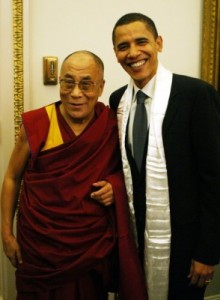 As Sundari recently noted, “[o]ver the next few weeks Sikhs will join together to celebrate the 300th anniversary of the Sri Guru Granth Sahib.” I didn’t anticipate that Sikhs would be joined by a major politician in those celebrations. To my surprise, Presidential hopeful Barack Obama (pictured here with His Holiness the 14th Dalai Lama) sent greetings to Sikhs on the 300th anniversary of the installation of the Guru Granth Sahib Ji. In the message — transmitted in a letter to the American Gurdwara Prabandhak Committee (an organization previously discussed here) — Senator Obama said:
As Sundari recently noted, “[o]ver the next few weeks Sikhs will join together to celebrate the 300th anniversary of the Sri Guru Granth Sahib.” I didn’t anticipate that Sikhs would be joined by a major politician in those celebrations. To my surprise, Presidential hopeful Barack Obama (pictured here with His Holiness the 14th Dalai Lama) sent greetings to Sikhs on the 300th anniversary of the installation of the Guru Granth Sahib Ji. In the message — transmitted in a letter to the American Gurdwara Prabandhak Committee (an organization previously discussed here) — Senator Obama said:
Throughout the world, Sikh communities are celebrating the tercentenary of the Guruship of Sri Guru Granth Sahib…. Sri Guru Granth Sahib is considered the universal spiritual leader and guiding light for the Sikh community. In 1708, Guru Gobind Singh officially ordained Guru Granth Sahib as the final and perpetual Guru of Sikhs. This worldwide celebration will commemorate the 300 years of consecration of Guru Granth Sahib and the anniversary of the accession of Guru Gobind Singh.On this momentous occasion, both Sikh and non-Sikh community members will gather together to promote [and] honour the contributions that Gurus have made to the Sikh community. [Link]
I am very pleased that a major political candidate has reached out to Sikhs and has demonstrated some familiarity with Sikh history and the importance of these celebrations in particular.
[Disclosure: In fairness, I attempted to locate any messages that Senator John McCain sent specifically to the Sikh community, but a Google search did not yield any satisfactory results. If anyone knows of any recent messages from Senator McCain to Sikhs, please provide a link in the comments section.]
